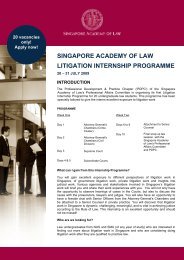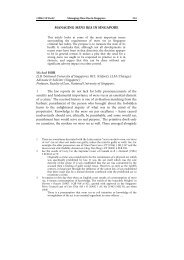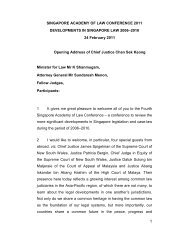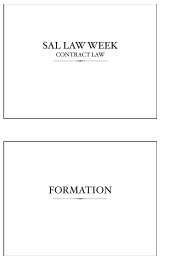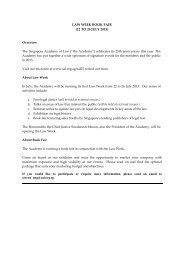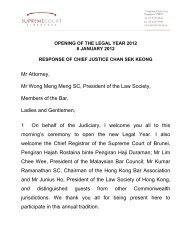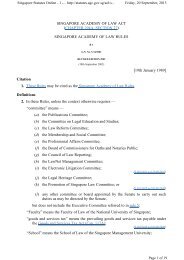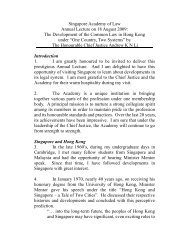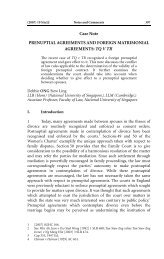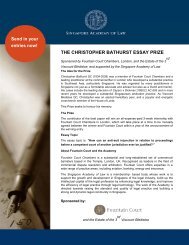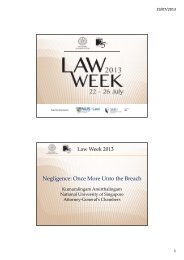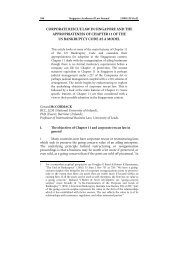View Article - Singapore Academy of Law
View Article - Singapore Academy of Law
View Article - Singapore Academy of Law
You also want an ePaper? Increase the reach of your titles
YUMPU automatically turns print PDFs into web optimized ePapers that Google loves.
15 SAcLJ Matrimonial Assets and the 3 rd Party 263<br />
judge. In my view, the applicant was no better than a sniper who,<br />
whilst concealed and protected by the foliage in which he hides,<br />
proceeds to take pot-shots at his unsuspecting opponent. He was<br />
not prepared to take on all the risks <strong>of</strong> a full battle and, when the<br />
event went against him, decided to change his role. Ought he to<br />
be permitted to do this I think not: for both principle and<br />
authority are against him. (per Gopal Sri Ram JCA)<br />
114 In Tradium, the 3 rd party appears to have been treated as if he<br />
was a party (by being allowed to make submissions in the proceedings<br />
and having orders made which affected him financially)—except that he<br />
was in an even better position, because as a non-party, he did not have<br />
the risk <strong>of</strong> facing an order for costs. Because it considered that the nonparty<br />
had been in a better position than a party would have been, the<br />
court decided that he could not appeal against the decision made. It is<br />
submitted, however, that the basis <strong>of</strong> this reasoning is flawed, firstly<br />
because the non-party should not have had the locus standi to make<br />
submissions in court and should therefore have been prevented from<br />
taking “pot-shots at his unsuspecting opponent”. The non-party should<br />
never have been placed in a better position than a party. Secondly, no<br />
orders should have been made which affected the non-party’s pecuniary<br />
interests without making him a party to the proceedings first. 89 It is<br />
therefore submitted that the views expressed by the Court <strong>of</strong> Appeal in<br />
Tradium regarding the non-party’s rights <strong>of</strong> appeal should not be<br />
followed. (Admittedly, in In Re Securities, supra, an order was made<br />
against persons whose interests as creditors were affected by the scheme<br />
<strong>of</strong> arrangement without their being joined as parties. But this may be<br />
explained on the basis that in a company’s winding up situation, there<br />
may be many creditors, and it would not have been practical to join<br />
every single one <strong>of</strong> them as parties before the court was able to approve<br />
the scheme <strong>of</strong> arrangement.) 90<br />
89<br />
90<br />
In this regard, see Sections 4.4.3-4.4.5 above.<br />
Kay LJ had observed in In Re Securities, supra, that the appellants in this case had<br />
the opportunity <strong>of</strong> joining themselves as parties to the proceedings, but failed to do<br />
so, and that in the circumstances, the case was not one in which leave to appeal ought<br />
to be given. It is submitted that this comment should be disregarded firstly on the<br />
basis that it is dicta, since the court was not asked to decide whether the appellants<br />
should be granted leave to appeal, but whether they needed leave to appeal.<br />
Secondly, the comment can be explained on the basis that in a company’s winding up<br />
case, there could potentially be many creditors. It would be commercially unviable if<br />
a scheme <strong>of</strong> arrangement that had been agreed to by those creditors who attended the<br />
creditors’ meeting could be appealed against by any creditor who had notice <strong>of</strong>, but<br />
chose not to, attend the meeting. Thus, for practical reasddons, [continued next page]



